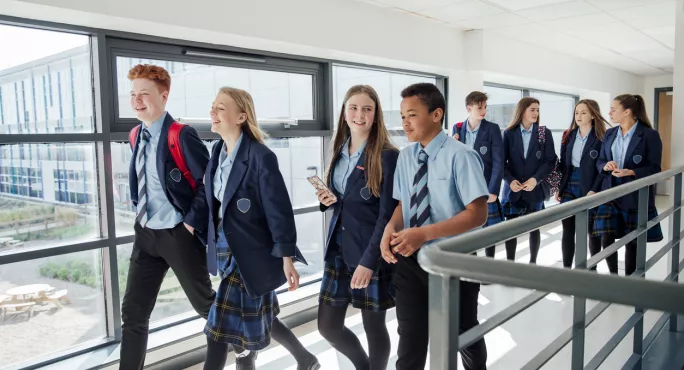There has been a doubling in the number of secondary schools in England at least partially closed because of Covid - in a week, new data official data shows.
Latest figures published today by the Department for Education (DfE) show the proportion of “fully open” state secondary schools fell by 8 percentage points last week - from 92 per cent on 17 September to 84 per cent on 24 September.
“Of those not fully open, this was mostly due to Covid-19 related reasons,” the DfE said.
Previous data: Around 1,000 schools not fully open last week, says DfE
Exclusive: One in seven teachers ‘on the brink’
Viewpoint: ‘Schools are not able to go on like this indefinitely’
Latest data shows there were 3,456 state secondaries in England in 2019-20; so this would amount to 553 secondaries at least partially closed, compared to 276 the previous week.
Geoff Barton, Association of School and College Leaders general secretary said: “We are extremely concerned to see a drop in the number of secondary schools fully open due to Covid cases and the resulting requirement for groups of pupils to self-isolate.
“This reflects the extremely difficult circumstances in which schools are operating amidst rising infection rates in the community.
“While there are some signs of improvement in accessing Covid tests and obtaining timely public health advice in the event of positive cases, we continue to receive reports from schools that problems persist, and this is not good enough.”
As a result of the dip in fully open schools, state secondary attendance also fell - from 86 per cent on 17 September to 84 per cent last Thursday.
But the proportion of state primary schools open to all pupils has stayed broadly stable, at 95 per cent, while attendance rose from 88 per cent on 17 September to 91 per cent last week.
Overall, the DfE’s figures show the proportion of fully open state schools decreased slightly, from 94 per cent on 17 September to 93 per cent on 24 September.
Again, responses from schools indicated that most not able to open fully were due to reasons related to Covid-19.
Of all schools that responded to the survey, 6 per cent said they were not fully open due to suspected or confirmed cases of Covid-19 on 24 September, up from 4 per cent the previous week.
According to the DfE, “schools are considered fully open if they are able to provide face-to-face teaching for all pupils on roll for the whole school day and they have not asked a group of pupils to self-isolate”.
“Where schools are not fully open, most pupils are still attending,” the department said.
“When pupils are unable to attend school because they are complying with clinical or public health advice, schools are expected to be able to immediately offer them access to remote education.”
Mr Barton added: “It is increasingly clear that schools have effectively found themselves on the frontline of managing the public health emergency, as well as delivering education, and the support simply has to be there.
“The pressure on school leaders and their staff is immense, and we are concerned that it is unsustainable over the long term, and will result in deteriorating mental health and wellbeing.
“The virus is an inescapable reality but there is much that the government can do to relieve associated pressures.
“It must reimburse schools for the costs involved in implementing safety measures to control the virus, clarify its plans and contingencies for next summer’s GCSEs and A-levels, suspend performance tables for this academic year, and postpone plans to resume Ofsted inspections in January.
“Schools need a greater sense that the government has grasped the scale of the challenge they face and that it is backing them up.”





